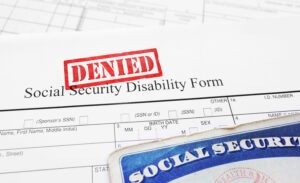
There are many conditions that are considered for disability. You may qualify for Social Security Disability (SSD) benefits if you have a permanent physical or mental impairment that prevents you from earning a substantial income.
You May Qualify for SSD Benefits if You Have a Condition Listed in the Blue Book
According to the Center on Budget and Policy Priorities (CBPP), more than eight million Americans receive SSD benefits. To be eligible for payments, you must have a condition that prevents you from engaging in “substantial gainful activity.” The Social Security Administration (SSA) Blue Book groups qualifying conditions into categories:
- Musculoskeletal disorders – such as spine, back, bone, and joint problems
- Special senses and speech problems – including speech, hearing, and vision impairment
- Cardiovascular issues – including coronary artery disease and chronic heart failure
- Respiratory illnesses – such as bronchitis, emphysema, asthma, and cystic fibrosis
- Chronic kidney failure (CKD) – including genitourinary disorders resulting in CKD
- Digestive system disorders – such as liver dysfunction, short bowel syndrome, and inflammatory bowel disease
- Skin disorders – including burns, chronic skin infections, and photosensitivity disorders
- Blood disorders – including leukemia, lymphoma, and hemophilia
- Endocrine disorders – including conditions affecting the pituitary, thyroid, parathyroid, adrenal, and pancreas
- Mental health conditions – such as schizophrenia, bipolar disorder, anxiety, and obsessive-compulsive disorder
- Neurological disorders – such as Huntington’s disease, epilepsy, and early-onset Alzheimer’s
- Cancer – including all cancers not already associated with another category
- Immune system disorders – including HIV, autoimmune disorders, and immune deficiency disorders
- Congenital conditions affecting multiple body systems – such as Down syndrome, Tay-Sachs, and phenylketonuria (PKU)
Can You Apply for Benefits for Conditions That Are Not Listed?
You can get SSD benefits for conditions not listed in the Blue Book. To receive payments, you must have proof of a medically determined impairment from a medical authority.
Your condition must also reduce your residual functional capacity (RFC) enough that you cannot work.
40+ years of experience from strong, knowledgeable, compassionate attorneys.
Start A Free EvaluationHow Do You Prove That You Have a Qualifying Condition?
When considering an SSD claim, the SSA asks five questions:
- Are you working?
- Does your condition significantly reduce your ability to do work-related activities for at least 12 months?
- Is your condition listed in the SSA Blue Book? If not, is it as severe as those listed?
- Does your condition prevent you from performing any of your previous work?
- Is there another type of work you can perform based on your impairment, age, employment experience, and education?
An essential element to a successful SSD claim is medical evidence. You will need to see a qualified healthcare provider for a diagnosis. Proof of your condition may include:
- MRIs
- CT scans
- Lab test results
- Mental health records
- X-rays
- Blood work
- Examination notes
- Treatment reports
We know you’re hurting. We can help. Free case evaluations, home and hospital visits.
Contact Us Now For HelpHow Much Money Will Your Disability Payments Provide?
The SSA oversees two different disability programs – Social Security Disability Insurance (SSDI) and Supplemental Security Insurance (SSI). Both programs require that you have a qualifying disability. However, the criteria for SSDI and SSI are different:
SSDI
SSDI is a program for workers who have paid into Social Security through their earnings. Usually, you must have 20 work credits (about five years of work) to qualify, but you may be eligible with fewer credits depending on your age.
The SSA determines your benefits by the number of work credits you have accumulated and the amount of your wage contributions. The more credits and the higher your earnings, the more you will receive in benefits.
According to the American Association of Retired Persons (AARP), the average monthly SSDI benefits for 2021 are around $1,200 per month.
SSI
SSI benefits are not based on work history but rather, financial need. The program helps disabled people who have limited income and resources.
In addition to federal SSI payments, most states, including Pennsylvania and Ohio, offer supplementary SSI benefits.
According to the SSA, as of January 1, 2021, the federal benefits rate is $794 per individual and $1,191 per couple. The rate is adjusted yearly based on the Consumer Price Index.
You need an attorney with the experience and dedication to give your case the care it deserves.
Start A Free EvaluationCan You Earn Any Income While Receiving Benefits?
There is a limit to how much you can make while working if you are receiving benefits. The SSA establishes a substantial gainful activity amount (SGA) each year.
If your earnings exceed the SGA, you may lose your benefits. The SGA for 2022 is between $1,350 and $2,260, depending on your disability.
We can address all the legal hurdles that may be keeping you from getting a fair settlement.
Speak To An Attorney TodayWhat Can You Do if the SSA Denies Your Benefits?
If the SSA denies your claim for medical reasons, you can file a Disability Appeal. You must do this within 60 days of receiving the denial. The appeals process has four levels:
- Reconsideration of the initial decision by a party not involved with the original determination
- Hearing before an Administrative Law Judge (ALJ)
- Review by the Appeals Council
- Federal court review
You may also appeal for non-medical reasons. Additionally, you can appeal if the SSA discontinues your benefits.
How Can an SSD Lawyer With Berger and Green Help With Your Claim?
Applying for SSD benefits can be complex. You want to make sure you supply the SSA with the information they need to approve your request, ideally on your first attempt. Our attorneys can:
- Review your initial application
- Review your income level
- Ensure you submit the appropriate medical information
- Help you appeal denied or discontinued benefits
- Represent you during an ALJ hearing
Call Our Offices for a Free Consultation
The team at Berger and Green has helped clients with their legal needs for more than 40 years. We know how important receiving your benefits is to you and your family. If you have a disability that prevents you from working, we are here for you.
We have assisted thousands of people with their SSDI and SSI cases, and we have a strong track record of successful SSD appeals. Contact our office with questions about what conditions are considered for disability and how to tackle the claims process. Take advantage of our free consultation at (412) 661-1400.










